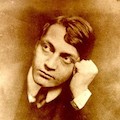Draft Article in Hungarian (1919)
[12] Text of handwritten fragments (apparently from later Galileo Disease times, before 1919). The photocopy is on the way with the other writings, but it is difficult to read.
"Once upon a time, the apostates, the atheists, were called free thinkers.
We have been past this for a long time. Even among atheists, there are countless prejudiced, petty-bourgeois-minded, unscrupulous souls who can be called everything rather than free-thinking. And the Religious Spirit can qualify the boldest rebellion of the spirit, and Jesus of Nazareth will forever remain the foremost among the martyrs of free thought.
By freedom of spirit we do not mean that it recognizes neither truth, nor right, nor authority.
On the contrary, he relentlessly seeks the truth, follows the command of morality, practices the law, and recognizes the authority. Relentlessly and consistently, without backing off any gaze and turning the drowsiness of the human mood into eternal vigilance. He seeks and seeks the truth in spite of and behind all kinds of class and racial truths, follows pure morality in spite of and beyond the morals of the moralists, stands on the foundation of the law in spite of the law, and bends only before the authority of the good and the righteous, turning away from all unscrupulous success and arrogance of power from his authority.
Relentlessly and without hesitation. Not bribed or compromised by any comfort, any inner sluggishness or outer hair, any spiritual habit or cheap fashion.
To seek the truth even where the prohibition tree of tradition stands in the way, to move forward on the path of moral demands, even when [13] when it is called "overworked idealism," "youth," he calls compromise, or simply "vegetable," wanting justice in spite of the paragraph, and erecting an altar to the authority of the heroes of goodness and truth on the ruins of the authorities of convention, cynicism, ignorance, and spiritual chastity.
But you shouldn't even stop here. Freedom of thought is for the whole people and therefore it must be protected against the people. Because the crowd does not think and is therefore an enemy of freedom of thought. As Constantin Brunner says, “The non-thinking people are impatient, unwilling, and unable to provide freedom of thought for the people of the spirit — though only these can actually be freedom of thought, freedom of thought, and freedom of feeling, whether or not they are guaranteed from the outside. on freedom of thought and true content of thought: the other thing that the people themselves call freedom of thought is freedom from thinking, freedom not to think, freedom in superstition, freedom not to be recognized as thinking."
The non-thinking people are not the class of the workers, but all the masses: whether those sitting in the cafeteria or reading the newspaper, or going to the church, or listening to the assembly, or the so-called "educated" or "bourgeois."
The free thinker, therefore, does what is the duty of every brave and consistent soul, merely - consciously.
Conscious purposeful: living according to principles and ideals. His conscious enemy: all uncontrolled concepts and sound phrases, all arguments, positions, and teachings that bring the soul's freest life… "
Article Informations
Reference:
Original Publication: Cikkszám magyar nyelven
KPA: 01/28 (Two versions: the first is hand-written (5 p.), and the second is typed (2 p.)
Other Languages:
| Lg | Name |
|---|---|
| DE | |
| FR | Brouillon d'article en hongrois (1919) |

